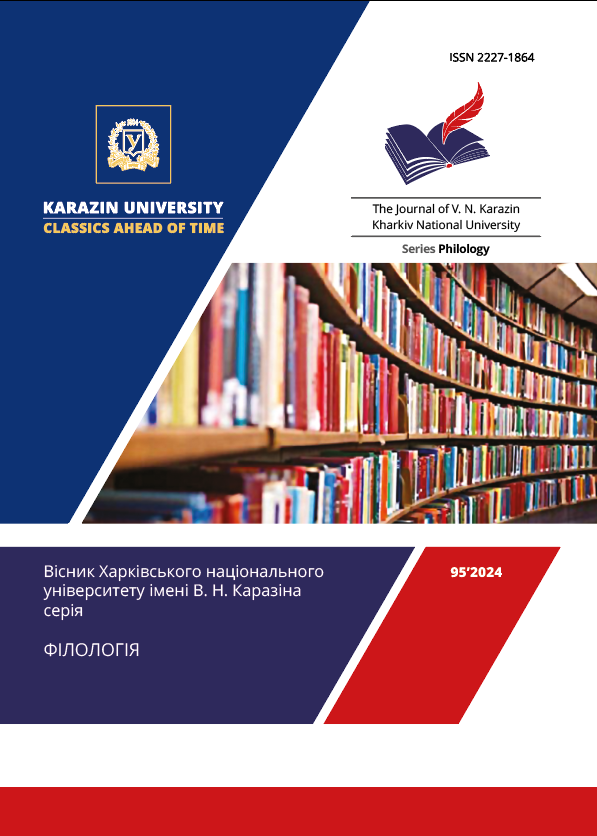The Potential of Distance Learning within the Course “History of Linguistic Studies”
Abstract
The transformation of the educational space at the beginning of the 21st century involves the further improvement of academic disciplines and students' competencies. The distance learning system (DLS) Moodle provides new opportunities for this.
The purpose of the article is the formation of scenarios for using the potential of the DLS Moodle using the example of the distance learning course "History of Linguistic Studies".
The realization of the potential of DLS is related to the structuring of educational information, the analysis of tasks and the content of a specific discipline. The purpose of the special course "History of Linguistic Studies" is to acquaint philologists with the evolution of linguistic science. The specificity of the distance course provides for the placement of educational and informational content in several blocks (parts). The main attention is paid to the substantive part, the basic elements of which are "Lecture", "Seminar session", "Main Forum" and "Additional Forum". Lecture information is accompanied by additional sources: presentations, videos, scientific publications, etc. Independent work and ongoing control are organized within seminar classes and forums. Seminar classes take place in classroom and/or correspondence formats. A specific component of DLS are forums, participation in which involves creating an essay on a certain aspect of the topic. In the main forums, several "basic" aspects are brought up for discussion; additional ones relate to issues qualified as optional. The formation of student autonomy involves participation in improving the course under the guidance of a teacher-moderator. This activity includes: creation of presentations, reasoned analysis of presentations of fellow students, discussion of the analysis of presentations and making appropriate corrections. In this way, indirect work takes place with the maximum possible range of topics.
The course has potential for improvement in the direction of organizing seminars and forums, as well as monitoring the content used by students. The acquired experience can be used in the creation and improvement of distance courses in other disciplines of the linguistic cycle of higher philological education.
Downloads
References
Bilous O. A., Govorun T. P. (2012) Peculiarities of the implementation of remote technologies in the educational process in higher education. Distance education of the 21st century: problems, experience, prospects: collection of scientific articles of the International Scientific and Practical Conference. 2012. Retrieved from https://essuir.sumdu.edu.ua/bitstream-download/123456789/30037/1/stbelgorod.pdf (access date: 07/29/2024) [in Ukrainian]
Voronets L. P. (2009) Didactic foundations of training course formation in higher education institutions of III-IV levels of accreditation (Author's review. thesis ... candidate ped. Sciences: specialist 13.01.09 "Learning theory") Kryvyi Rih. [in Ukrainian]
Malikhin O. V., Karpyuk V. A. (2018) Methodology of using ICT in the process of formation of linguo-regional studies competence of philology students. Information technologies and means of education. 68(6), 112-124. Retrieved from https://doi.org/10.33407/itlt. v68i6.2171 (access date: 07/27/2024) [in Ukrainian]
Morse N. V., Kocharyan A. B. (2014) The model of the standard of ICT competence of university teachers in the context of improving the quality of education. Information technologies and means of education. 43(5), 27-39. Retrieved from http://elibrary.kubg.edu.ua/6198 (access date: 07/28/2024) [in Ukrainian]
Educational and professional program "Applied linguistics and the English language" (2023). Retrieved from https://philology.karazin.ua/wp-content/uploads/2023/07/OPP_mag_22_23_prikladna_linguistik.pdf (access date: 07/20/2024) [in Ukrainian]
Popov R. A. (2019) The set of organizational and didactic conditions for the implementation of the student autonomy development system model. Bulletin of the Alfred Nobel University. Ser. Pedagogy and psychology. Pedagogical sciences. 1(17), 183-189. Retrieved from https://pedpsy.duan.edu.ua/images/PDF/2019/1/24.pdf (access date: 07/25/2024) [in Ukrainian]
Prakhova S. A., & Datsenko O. A., & Semenov K. A. (2020) Distance learning in the space of modern educational systems: psychological context. Bulletin of Alfred Nobel University. Series: Pedagogy and psychology. 2, 260-264. Retrieved from https://repo.dma.dp.ua/7417/1/31.pdf (access date: 07/30/2024) [in Ukrainian]
Sinyagovska I. Yu. (2011) Formation of cognitive independence of students of a pedagogical university in the process of learning a foreign language: author's abstract. thesis ... candidate ped. Sciences: 13.00.09. Kryvyi Rih. [in Ukrainian]
Trius Yu. V., & Gerasimenko I. V., & Franchuk V. M. (2012) MOODLE-based university e-learning system: Methodical guide. Ed. Yu. V. Tryus. Cherkasy. [in Ukrainian]
Chumak V. V. (2012) Implementation of information and communication technologies in the process of solving psychological problems by university students. Actual problems of psychology: Collection of scientific works of the H. S. Kostyuk Institute of Psychology of the National Academy of Sciences of Ukraine. Zhytomyr: Publication of ZhDU named after I. Franka. Volume 8. Psychological theory and teaching technology. Issue 8., 161-171. Retrieved from https://newlearning.org.ua/sites/default/files/praci/2012_8/st14.pdf (access date: 07/25/2024) [in Ukrainian]
Yashchuk H. (2024) Distance learning as a process of creating educational products. Actual problems of automation and management: Materials of the international scientific and practical Internet conference of young scientists and students. Lutsk. Retrieved from http://av.lntu.edu.ua/attachments/article/332/3_Yashchuk.pdf (access date: 07/30/2024) [in Ukrainian]




